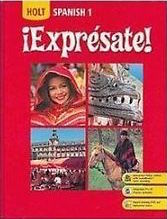
Expresate!: Spanish 1
1st Edition
ISBN: 9780030452048
Textbook solutions
All Solutions
Page 96: 20
Exercise 1
Step 1
1 of 3
In this section, you are asked to use the given phrase to start a sentence pertaining to the pictured activity or place.
The example reads, “today I want to go to the pool”.
The example reads, “today I want to go to the pool”.
The first phrase reads, “I like…” and shows a picture of a piano.
Step 2
2 of 3
Back on page 94, you learned that *tocar el piano* means “to play the piano”. *Tocar* is an infinitive, coming after the given “*yo*” form of “*gustar*”.
Result
3 of 3
Me gusta tocar el piano.
Exercise 2
Step 1
1 of 3
In this section, you are asked to use the given phrase to start a sentence pertaining to the pictured activity or place.
The example reads, “today I want to go to the pool”.
The example reads, “today I want to go to the pool”.
The second phrase reads, “I want…” and shows a picture of roller skates.
Step 2
2 of 3
You learned, at the beginning of this Chapter, that *patinar* is an infinitive that means “to skate”. Since *quiero* is the first-person, singular form of *querer* (meaning “I want”), simply place the infinitive *”patinar”* following the form of *querer* to complete your sentence.
Result
3 of 3
Quiero patinar.
Exercise 3
Step 1
1 of 3
In this section, you are asked to use the given phrase to start a sentence pertaining to the pictured activity or place.
The example reads, “today I want to go to the pool”.
The example reads, “today I want to go to the pool”.
The third phrase reads, “tomorrow I go…” and shows a church.
Step 2
2 of 3
On page 95, you learned how to use *voy* to tell someone where you are going. You can follow this with another phrase you learned on page 95, “*…a la iglesia”* (“to church”).
Result
3 of 3
Mañana voy a la iglesia.
Exercise 4
Step 1
1 of 4
In this section, you are asked to use the given phrase to start a sentence pertaining to the pictured activity or place.
The example reads, “today I want to go to the pool”.
The example reads, “today I want to go to the pool”.
The fourth phrase reads, “when the weather is nice, I want to go…” and shows someone running in a park.
Step 2
2 of 4
At the bottom of page 95, you learned phrases like the one you are presented with here, including the vocabulary word *parque*, meaning “park”.
Step 3
3 of 4
Notice that since *parque* is masculine, you will precede it with *”al*”, the combination of *”a*” and “*el*”.
Result
4 of 4
Cuando hace buen tiempo, quiero ir al parque.
Exercise 5
Step 1
1 of 4
In this section, you are asked to use the given phrase to start a sentence pertaining to the pictured activity or place.
The example reads, “today I want to go to the pool”.
The example reads, “today I want to go to the pool”.
The fifth phrase reads, “do you like to go…?” and shows a picture of a nice beach scene.
Step 2
2 of 4
Notice the *tú* form of *gustar*, “*te gusta”* in the question, followed by the infinitive *”ir”*, meaning “to go”. The inclusion of question marks makes the entire sentence a question.
Step 3
3 of 4
On page 95 you learned how to say “…to the beach”, in the context of telling someone where you are going. Simply place this phrase after the given phrase to complete your question.
Result
4 of 4
¿Te gusta ir a la playa?
Exercise 6
Step 1
1 of 3
In this section, you are asked to use the given phrase to start a sentence pertaining to the pictured activity or place.
The example reads, “today I want to go to the pool”.
The example reads, “today I want to go to the pool”.
The sixth and final phrase reads, “when the weather is bad, do you like …?” and shows a picture of a kid talking on the phone.
Step 2
2 of 3
Back on page 94, you learned how to say the phrase “to talk on the phone”. This is the phrase you will use to complete the sentence here. Note the use of the “*tú”* form of *gustar* in the question, as well as the inclusion of the newly learned phrase, “when the weather is bad”.
Result
3 of 3
Cuando hace mal tiempo, ¿te gusta hablar por teléfono?
unlock

